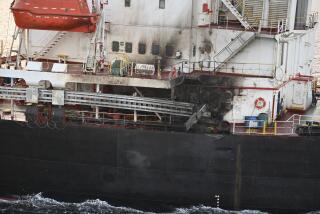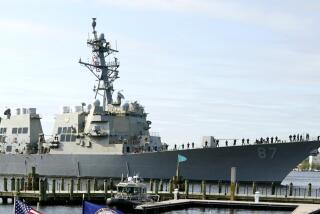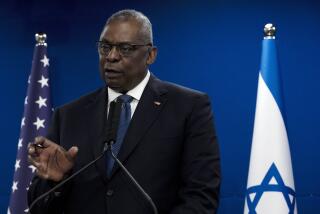CRISIS IN THE PERSIAN GULF : German Ships Sail for Duty in Mediterranean : Policy: The minesweepers leave behind a debate over Bonn’s ban on deploying its forces abroad and the military role of a united Germany.
- Share via
WEST BERLIN — Seven West German warships slipped out of the North Sea port of Wilhelmshaven and headed for the Mediterranean on Thursday, leaving in their wake a heated debate about the military role of a united Germany.
The ships--five minesweepers and two support vessels--are to relieve U.S. warships ordered to leave the Mediterranean and move into the troubled Persian Gulf, along with ships of Britain, France, the Netherlands and Belgium.
At issue is the matter of West Germany’s longstanding, self-imposed ban on deploying military force in an area of potential conflict outside Europe.
Iraq’s takeover in Kuwait, coming on the verge of German unification and at a time when Germany is about to recover its full sovereignty for the first time since World War II, has touched off a premature confrontation for Germans and other Europeans on the question of limiting German military power.
So far, European defense experts seem more relieved than upset at the tenor of the debate, which has gone into German military activity only in connection with multinational action.
“Germany has to begin to rethink its future (military) role,” said Francois Heisbourg, head of the International Institute of Strategic Studies in London. “Its defense capabilities (outside Europe) have to have either a national or a joint European-Western emphasis. The debate seems to have stressed the second option. It shows they have learned the lessons of history.”
The debate broke into the public domain earlier in the week with reports that West German Chancellor Helmut Kohl had raised the prospect of West German military units joining in the Western effort to prevent Iraq from advancing beyond Kuwait into Saudi Arabia.
Sources close to Kohl emphasized that no binding commitment has been made. They said Kohl’s thinking reflects his belief that West Germany should support the U.S.-led action against Iraq in return for Washington’s strong support of German unity, which is expected to be complete by the end of the year.
Opposition Social Democrats quickly condemned the idea of sending West German forces to the Persian Gulf, arguing that to do so would contravene constitutional restrictions on the use of German forces.
But Kohl’s Christian Democrats argue that restrictions on military activity are based not on any constitutional provision but on the policies of successive governments. They look on opposition proposals to amend the constitution as part of an attempt to limit future German military activity with clear, explicit language.
On Monday, Kohl, Foreign Minister Hans-Dietrich Genscher and Defense Minister Gerhard Stoltenberg are scheduled to discuss the issue at a meeting in Bonn of the Bundestag’s Foreign Affairs Committee. On Tuesday, Stoltenberg and Genscher will travel to Paris for a meeting of the West European Union to coordinate the command of forces sent to the Persian Gulf region.
Patrick Raes, a spokesman for the West European Union, said there will be no attempt to pressure the Germans to enter the gulf.
“It is not up to us,” he said, “to ask the West Germans to alter their internal positions.”
West Germany alone among the 16 members of the North Atlantic Treaty Organization places virtually all its armed forces under the alliance’s integrated command. The West Germans have rarely been asked to take part in U.N. peacekeeping operations, and on the few occasions when military units have been employed it has been for humanitarian purposes.
The Luftwaffe recently helped fly out European civilians trapped by fighting in Monrovia, the war-torn capital of Liberia. In 1987, during another crisis in the Persian Gulf, West German minesweepers were sent to the Mediterranean to relieve allied ships ordered to the gulf.
Although the restrictive policy has kept West Germany down as a military power, few seem to have minded--in West Germany or in neighboring countries.
The West German economy has benefited by not having to support military ventures in distant places; West German exporters have happily traded with both sides in most disputes, and the neighboring countries have been free of the fear of revived German militarism.
More to Read
Sign up for Essential California
The most important California stories and recommendations in your inbox every morning.
You may occasionally receive promotional content from the Los Angeles Times.









